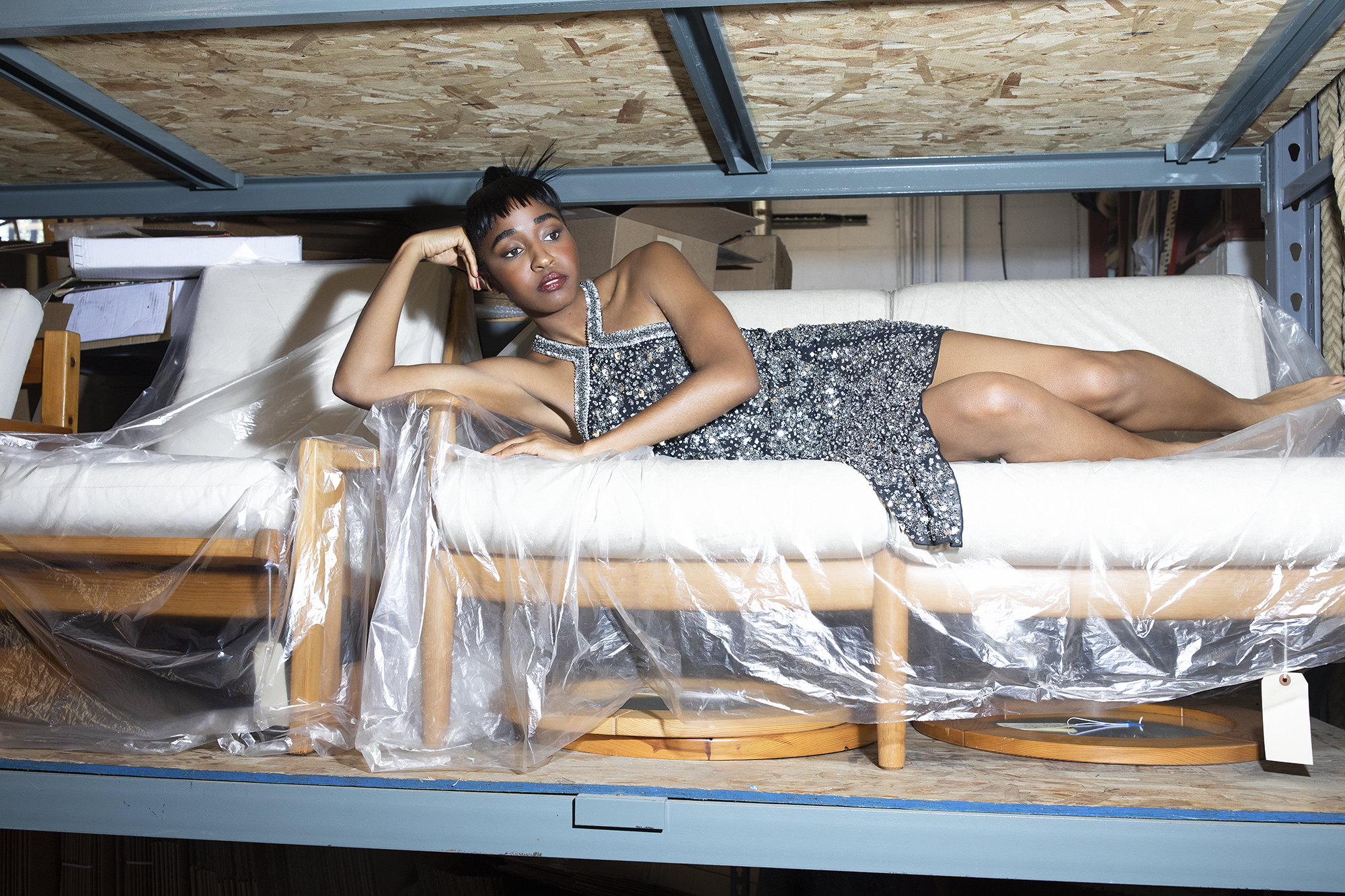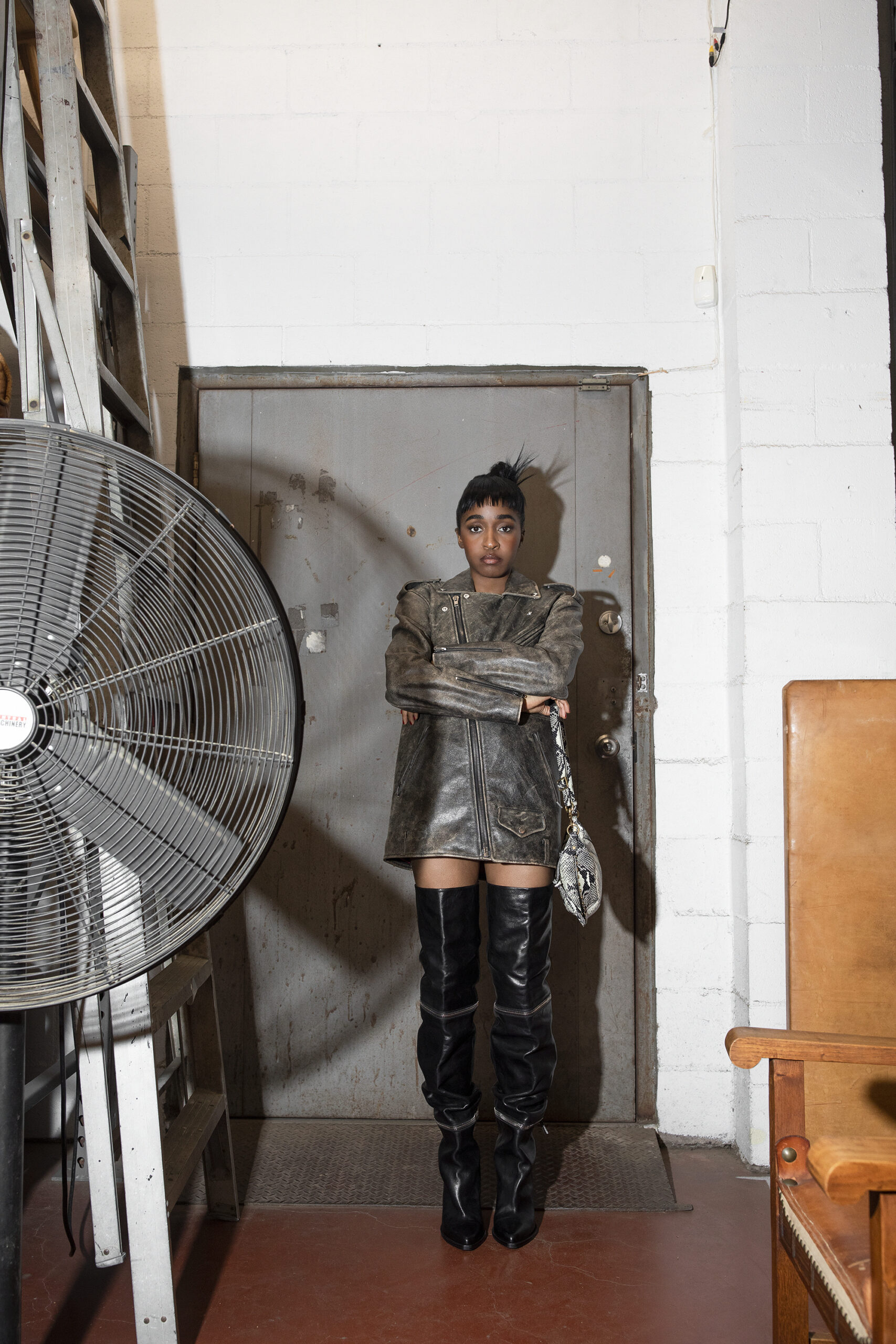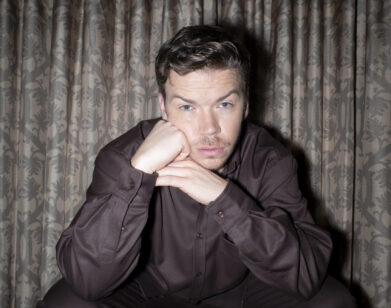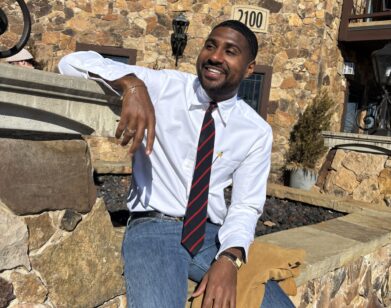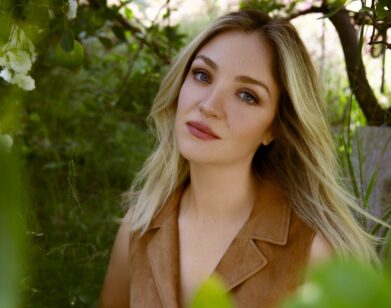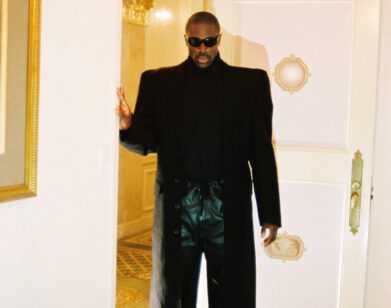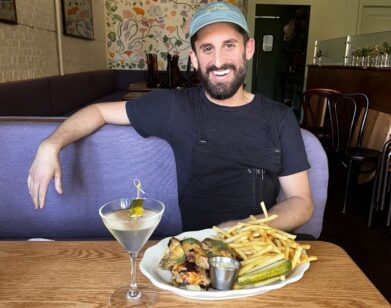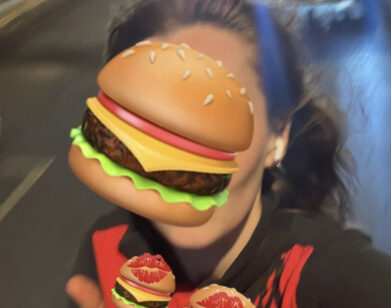CHEF
Ayo Edebiri Is Skeptical of Her Success
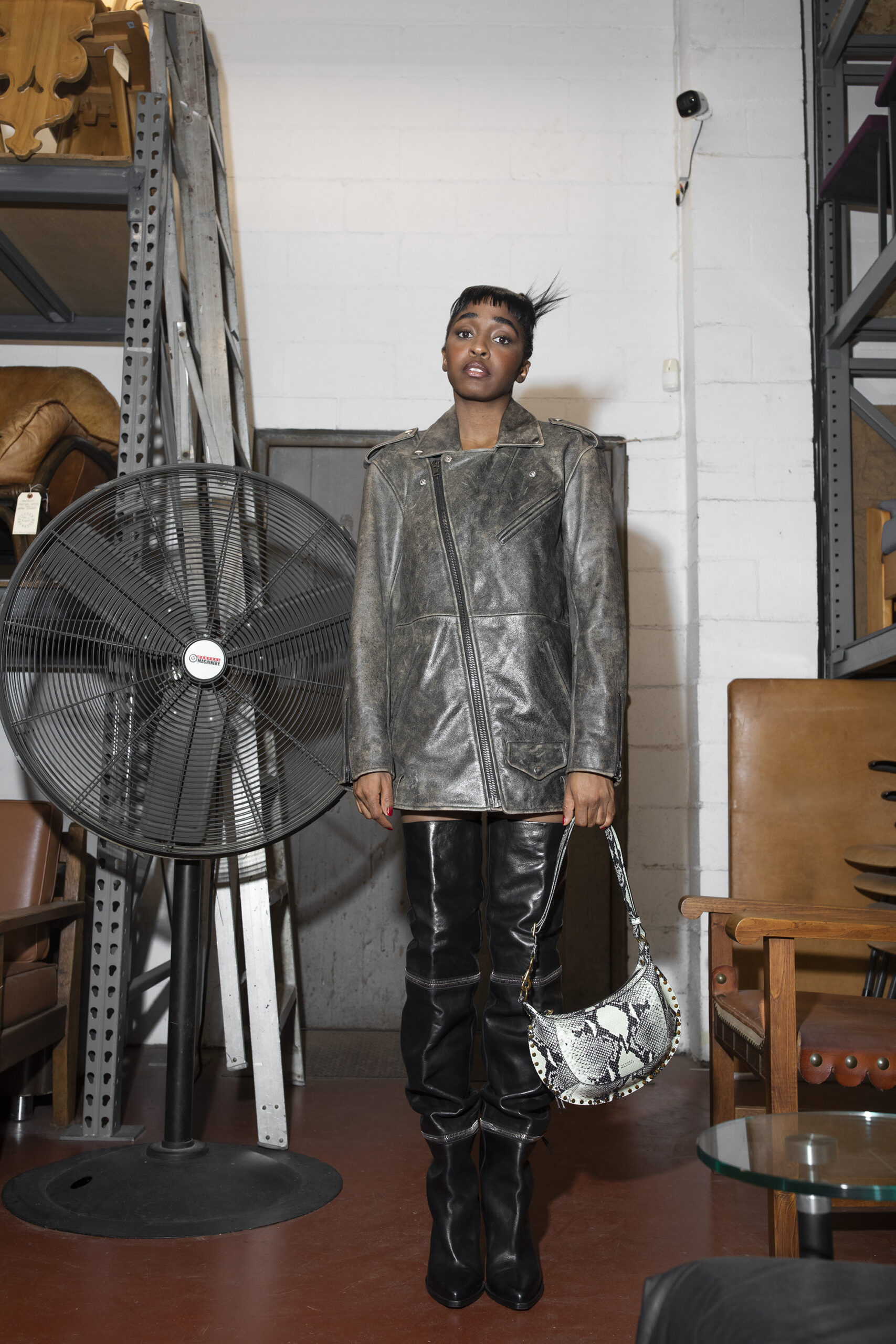
Ayo Edebiri wears Leather Jacket, Oskan Moon Python Bag in Sand, and Lelodie Boots Isabel Marant.
Ayo Edebiri is still spinning from Thom Browne’s couture extravaganza when she logs on with the filmmaker Daniel Kwan from her Paris hotel room. Fashion front rows still count as mindfucks for the 27-year-old actor and writer, who can next be seen in the comedy Bottoms, but that’s reality when you go from stand-up comic to star of The Bear in just a few short years. Kwan, who just won a bunch of Oscars for codirecting Everything Everywhere All at Once, knows what the sudden rush of success feels like, which made him the perfect person to help Edebiri try to process it.
_________
MONDAY 7 AM JULY 3,2023 PARIS
DANIEL KWAN: Hi! We’re jumping right in.
AYO EDEBIRI: Let’s go.
KWAN: Last night when you texted me five times and called me because I missed our interview time, I was really—high is not the right word. I take edible gummies to help me fall asleep, and I take some heavy shit. I was basically out of commission.
EDEBIRI: You and I both need assistance with our concepts of time. [Laughs]
KWAN: That’s not our problem. I think the whole system of time zones is flawed. So where are you?
EDEBIRI: I’m in Paris and it’s 7 a.m., and you’re in L.A. and it’s 10 p.m.
KWAN: What are you up to?
EDEBIRI: I’m in my alternate life. I went to the Thom Browne couture show, and it was beautiful and insane and I feel nuts in the best way.
KWAN: Have you always been into fashion?
EDEBIRI: I’ve always enjoyed clothes, but as a stand-up I got very into this uniform of big shirt, big pants, which I still think is cool, but I had this idea that if people see my body, they won’t take me seriously in stand-up.
KWAN: I’m sorry, it sucks that you even felt that way.
EDEBIRI: Yeah, I hate that I’m even saying it.
KWAN: No, it’s honest. But you proved yourself wrong.
EDEBIRI: I don’t know, because now I’m going to these fashion shows and I haven’t been doing stand-up as much.
KWAN: How long have you been doing this PR circus for? Because it’s nonstop.
EDEBIRI: We started as soon as The Bear first came out last year. I was like, “Wait, I’m in New York doing Kelly Ripa. What is happening to my reality right now?” It just picked up from there, because then the award shows started, which is when we met.
KWAN: So you haven’t had time to breathe or think. I like this phase in people’s lives where they are in the mess and they haven’t had time to reflect. What is the state of your brain right now?
EDEBIRI: I’m just trying to take it all in. There’s been a lot of new energy. Did you feel that way?
KWAN: Yes. A friend of mine who had already gone through an awards campaign said, “You’re going to get a lot of energy directed your way. A lot of it’s good, but it doesn’t matter. It will still take the same toll on you.”
EDEBIRI: Yeah, most people are wonderful, but there’s an abundance of energy and I can only digest so much.
KWAN: The amount of people you’re meeting is wild. Do you have an interaction from the past year that stands out?
EDEBIRI: I have one that’s sad and surreal, but it’s name-droppy.
KWAN: Do you want to get sad and name-droppy?
EDEBIRI: It was when I met Robert De Niro—of course this would happen to me. [Laughs] At Tribeca [Film Festival], I was going to all these dinners, and I really wanted to meet him, and because I’m a nut-case, I was convinced that we would just get along. I knew it in my soul. When I met him, I couldn’t have met anybody less interested in meeting me.
KWAN: No!
EDEBIRI: Our conduit was like, “This is Ayo, she’s on this TV show,” that he’s obviously never watched, and I saw him do that thing where he kind of clicked his left eye a little bit past me to somebody that he knew, and I said, “You can just talk to whoever you actually want to talk to.” And he went, “What?”
KWAN: [Laughs] Oh god!
EDEBIRI: That one was really humbling, because I’d been going up to so-and-so saying, “I’m a fan,” and they’re like, “Thank you!” I was on a hot streak and I got humbled.
KWAN: That happened to me when I first met boygenius. I was at the Beau Is Afraid screening, and I came in really hot because I was so excited, and I was talking to Julien [Baker] and Lucy [Dacus], but I don’t think they knew who I was, and then the conversation just kind of ended.
EDEBIRI: Oh my god.
KWAN: [Laughs] It’s so important to be grounded in that way, though. I was at the Hollywood Climate Summit last week on a panel with Quinta Brunson, who was talking about how she’s been on the same wave as you, just going nonstop, and now because of the writers’ strike, she’s finally able to tap back in. I find it fascinating when an artist I love gets super successful and their work slowly starts getting worse. I always wonder if it’s because success pulls you away from the things that made you a good artist.
EDEBIRI: Yeah. Part of it is becoming aware of what people want from you, and then you become too conscious of delivering or subverting those expectations.
KWAN: Yeah. Me and the other Daniel [Scheinert] talk a lot about the dangers of self-mythologizing and how that’s what doing press is. Press is just slowly, accidentally rewriting your own story in a way that makes it much simpler to understand, so people have soundbites.
EDEBIRI: A lot of times you’re going a bit crazy because you’ve said the same thing 30 times and you want to say it in a different way, but in a way that still feels true. The reality is that we have all these conflicting truths and none of us knows why we are the way we are, unless you’ve been in therapy for 30 years.
KWAN: Speaking of self-mythologizing, I think celebrity culture tells us who we are as a society and the people we decide to put up on a pedestal tell us a lot about ourselves. So with that being said, what does it say about our society right now that you, Ayo, are a rising star?
EDEBIRI: [Laughs] What a casual question. You’re diabolical.
KWAN: [Laughs] You don’t have to answer it, but the reason I bring it up is because one of the first times we hung out we were talking about how weird it is that we’re finding success. Because growing up, you’d never imagine we would be in this position at all.
EDEBIRI: I hope it’s a good thing, but there’s obviously that cynical part of my brain that wonders if I’m just a cog in the machine of capitalism. How do I make myself somebody who’s able to have a career, and not just be this moment of an idea of a type of person?
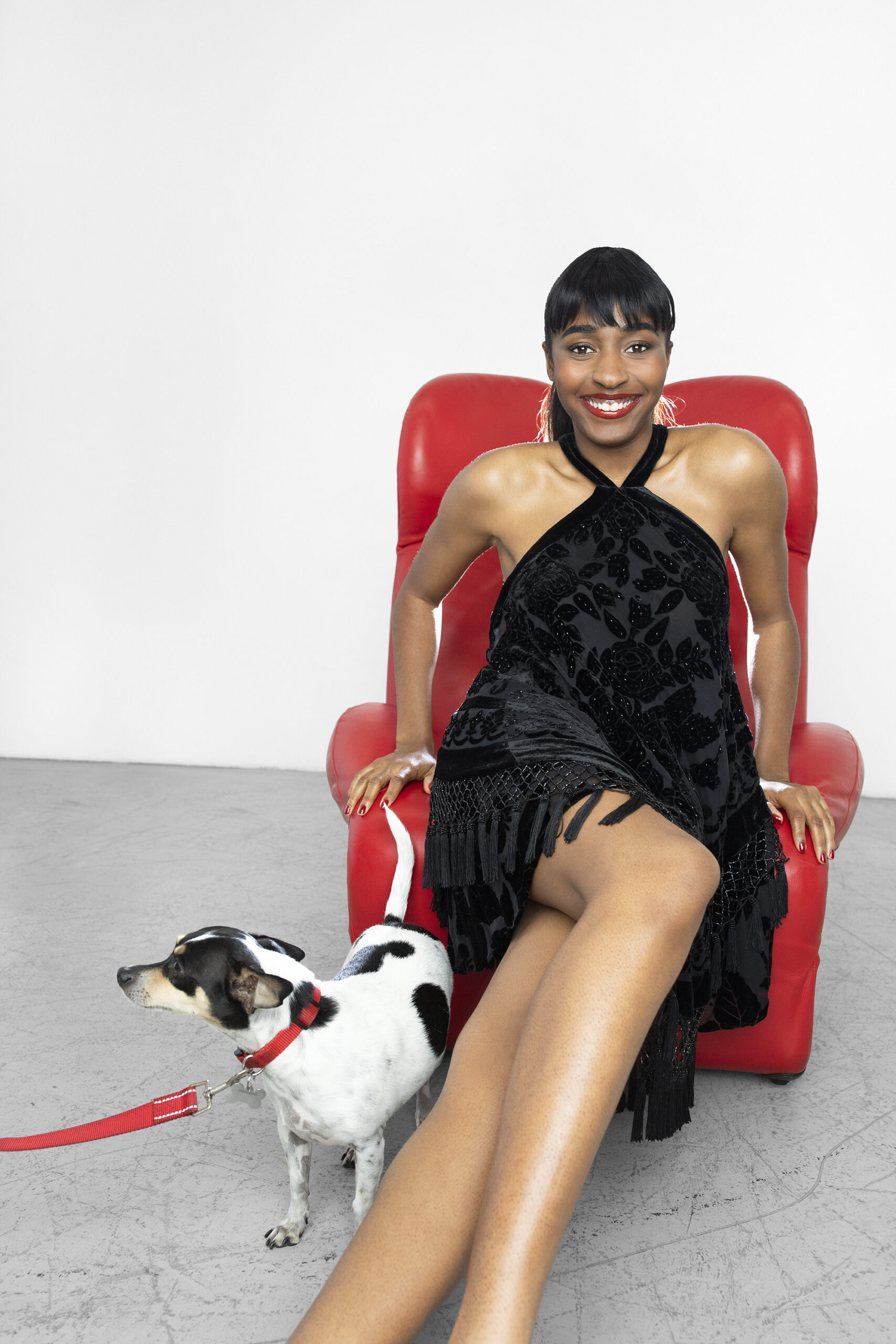
Zilda Dress Isabel Marant.
KWAN: I love this. Say something right now that will break you out of commodification.
EDEBIRI: Just say my worst opinion?
KWAN: [Laughs] No, just the most truthful opinion. Did you get PR training before this all started?
EDEBIRI: When everything happened with Big Mouth, I got thrown into PR life.
KWAN: I ask because we did one interview and people were like, “They need some training.” We learned a lot, but then we made the informed decision to not listen to anything they told us. Obviously there’s a reason why these rules exist, but people were really drawn to how honest we were, which is why I ask if you feel an impulse to break away from that feeling of commodifying yourself.
EDEBIRI: It’s weird, because when I have been doing interviews, I’ve just been talking, and sometimes I’m like, “I’ve got to be careful.”
KWAN: That’s usually when me and Daniel [Scheinert] feel alive, when we don’t know what we’re doing. And of course, it gets us in trouble. One of the things we told our PR training person was that these movies are really personal to us and we treat the press as if they’re therapists. And she’s like, “Never do that.”
EDEBIRI: A PR person’s worst nightmare.
KWAN: Exactly. But the only way to make this bearable is if I’m learning about myself or how my work interacts with the world, and that requires a bizarre vulnerability, which I find kind of fun. You’re lucky because you’re very fun to talk to, so it’s easy. But also, your brain fires at 30 miles an hour.
EDEBIRI: Yeah, we’ve had conversations where we’re talking so fast, but we’re still on the same page.
KWAN: Yeah. So, WGA is striking and SAG may be striking soon and no one really knows what to do. How are you feeling at this moment? Especially because you are a writer and an actress.
EDEBIRI: Honestly, I’m a bit confused. I don’t know what’s going on, and I want to be open about that, because I feel like people are afraid. Obviously this is not the same, but with marginalized identities, there’s often this all-or-nothing, we-are-rallying feeling. “Let’s fight! Onward we march!” And nobody’s stopping to check in. But sometimes, the strongest show of solidarity is tapping in with each other.
KWAN: The reason why it’s so confusing is because we’re looking at such a small part of the picture. Everyone in every sector is mobilizing. We have to remind ourselves that we are part of that bigger-picture conversation. Like with AI for instance, I’ve been talking to people about whether it makes sense for a massive cross-labor coalition to happen in the face of this potentially existential threat.
EDEBIRI: I remember when BLM and Stop Asian Hate and the Supreme Court rollback of Roe v. Wade happened, there kept being these bubbles of thought about a general strike. We need to think about our priorities and what we want out of this society and out of each other.
KWAN: People are realizing that if we’re going to change things, we have to start thinking big-picture.
EDEBIRI: And we need ideas outside of the shapes that we are accustomed to.
KWAN: I know it’s clichéd, but people say, “That’s what storytelling is for, to expand imagination.” But it’s hard for us as storytellers to know what that looks like because we’re not experts in any of this stuff. We’re not scientists, we’re not politicians. So a lot of storytellers retreat into things that they do know, which makes sense, but one thing I’m trying to popularize among my filmmaker and writer friends is finding an expert in a cause you care about, who you want to amplify or translate for. It’s weird that we’re supposed to be telling stories that cultivate a conversation and help us understand who we are, but we’re not actually having these intersectional and interdisciplinary conversations.
EDEBIRI: Well, the way that fame works is that you become the object that people want to digest, and are rewarded for being a celebrity who’s like, “These are my causes and this is what I do.” I don’t know why. I prefer to listen to a history podcast where a guy who’s got a monotone voice is talking about this thing that he’s dedicated his life to, rather than just two people gabbing. But also, I’m one of the gabbers.
KWAN: Yeah, we have to be deliberate about our attention, especially when you think about the attention economy and how everything is driven towards wasting viewers’ time to get ad revenue. It’s completely bastardizing every single thing it’s touching. Look what’s happening to journalism and TV and film. We’re part of that problem, the fact that we’re saying this stuff that is going to be in a magazine that is going to be advertised—
EDEBIRI: That we’re going to post on social media, that I took pictures for. Yeah.
KWAN: Exactly. Every time I post something, I think about how much accumulated human attention I have taken. I’ve been calling it attention extraction. If I’m going to take your attention, how can I make the most of it at that moment? A lot of people think we need to entertain people and take their minds off the problems of the world, which is valid, but if the majority of our work is that, then are we failing at our job? What is the responsibility of a storyteller?
EDEBIRI: It’s back to accepting the reality of fame, and it’s like, “How are you using that in a way that feels simultaneously honest and sustainable?”
KWAN: Yeah. If I’m being honest, before I even saw The Bear, I interacted with the idea of you in New York Magazine, where they ask you what you can’t live without.
EDEBIRI: Oh my god, the Strategist thing.
KWAN: Exactly. They ask you to list things that you like that they can sell to other people. You were really thoughtful about what you put on there, like the book How to Blow Up a Pipeline.
EDEBIRI: I also told people to donate to SisterSong [Women of Color Reproductive Justice Collective].
KWAN: Yes. It’s turning the attention economy and the capitalist idea of trying to sell things on its head. You care so deeply about history and big-picture ideas in a way that I really love.
EDEBIRI: Also, we both grew up Christian, and pretty intensely. Growing up, I had such a present sense of doom. I was constantly afraid of the apocalypse. I had a lot of love, but it wasn’t rooted in other people. It was all acts of service for this future thing that is greater than anything anyone else could conceive, and I feel like this second adolescence I’ve been having has been about gratitude for the present. I want to try my hardest to be invested in reality and other people, instead of an apocalypse.
KWAN: For me, the scariest thing as an evangelical was convincing the people around me that they’re going to hell. If I can’t convince them, how am I supposed to live with that? I think I’m still working through a lot of that trauma of needing to save the world and save myself. I have ADHD; I can barely take care of myself. What the hell? Why would god do this to me?
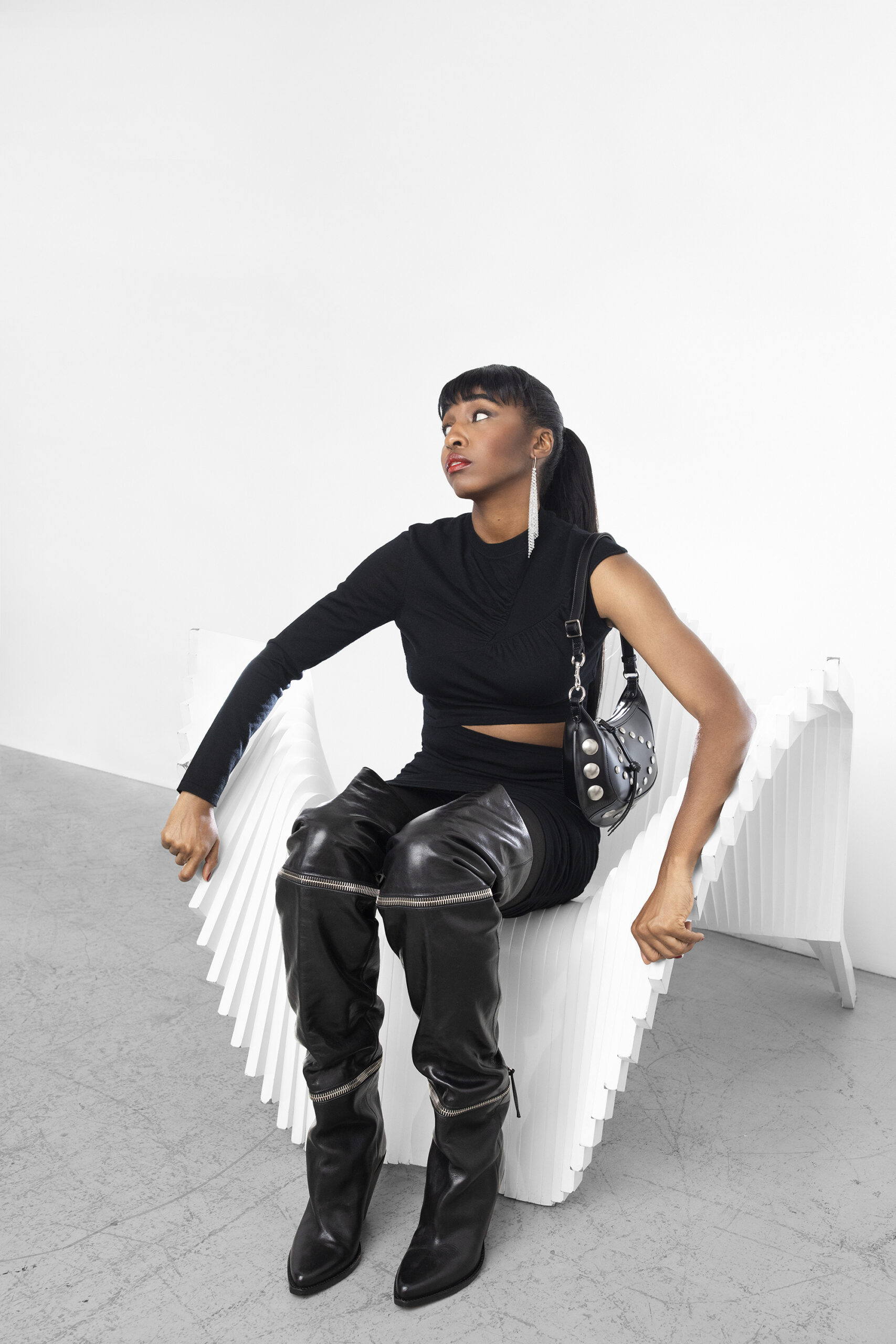
Polly Dress, Earring, Oskan Moon Maxi Stud Bag in Black, and Lelodie Boots Isabel Marant.
EDEBIRI: We’ve had some conversations about god, and I chose not to process things. So now is when I’m starting to open up again to the pain and also the beauty of it, and reconcile those two things. I don’t know if I can ever say goodbye totally, because part of what I’ve been redefining is this idea of truth. When you’re in that evangelical space, there’s only one absolute truth, and your specific church in a random neighborhood outside Boston is the only arbiter of that. We found out that we had that in common when—
KWAN: We were at the [Independent] Spirit Awards after-party and we were a little tipsy and started talking.
EDEBIRI: I was drunk. I will actually say that. Because we had both won.
KWAN: Yeah, that’s fair.
EDEBIRI: I remember saying that Everything Everywhere All at Once felt like a journey of faith. It felt almost the way that a sermon felt to me. And you were like, “I’m from Massachusetts and I grew up evangelical.” And I was like, “What?!”
KWAN: [Laughs] As I’m getting older—and I have a kid—I’m thinking about the continuous apocalypse that we all live in, my definition of god is evolving every day. It’s making me realize that maybe there is something I can still hold onto about god and what my stories are doing. It’s been really interesting for me to process that.
EDEBIRI: It’s a bit humbling.
KWAN: Oh, it’s terrifying. Okay, I know you probably have to go.
EDEBIRI: I know, but should we do rapid-fire?
KWAN: We can do rapid-fire. I have a very faithless view of fame, and I know that eventually we’re going to burn out. What are you going to pivot to next when your bubble pops and no one cares about you?
EDEBIRI: I could do ghostwriting, and I could live on a farm somewhere. Where are you going to pivot to?
KWAN: Well, I wanted to do children’s books, which I’ve already done, and I like teaching a lot, but probably not at the private college level, unless they make it tuition-free.
EDEBIRI: But I told you my dream dream.
KWAN: What’s your dream dream?
EDEBIRI: To open up a theater where my friends could put on shows or teach classes, and maybe there’s something public-access about it.
KWAN: Public access television. That’s the pivot.
EDEBIRI: I mean, that’d be sick.
KWAN: I once heard that miracles are a one-in-a-million chance, but if you imagine every moment is a chance in a million, you’d probably get a miracle every couple of months.
EDEBIRI: It’s devastatingly cheesy, but I really do believe in miracles and one-in-a-million things because I feel like I have—and you do too—a bit of a one-in-a-million life.
KWAN: So what is the most recent miracle you’ve had?
EDEBIRI: Making it alive out of that Robert De Niro situation. Anytime I’ve eaten food on a plane and lived to tell the tale. [Laughs]
KWAN: What was the meal to Paris?
EDEBIRI: It was a weird pasta that was full of uncomfortable cheese and a strange sauce. I had the butternut squash as well, and here I am, rock-n-roll.
KWAN: I just had butternut squash tonight, right before talking to you.
EDEBIRI: Always in flow, you and I.
*This interview and photoshoot was conducted prior to the SAG-AFTRA strike.
———
Hair: Marcia Hamilton using GHD at Forward Artists.
Makeup: Molly Greenwald using MILK Makeup at A-Frame Agency.
Nails: Yoko Sakakura using Chanel at A-Frame Agency.
Photography Assistant: Brandon Sheffield.
Fashion Assistant: Jack Wilson.
Production Assistant: Simons Finnerty.
Location: Amsterdam Modern.

